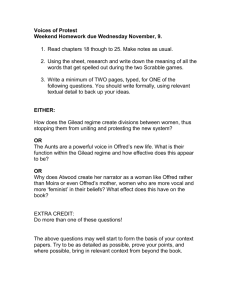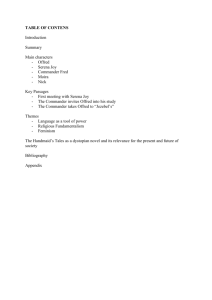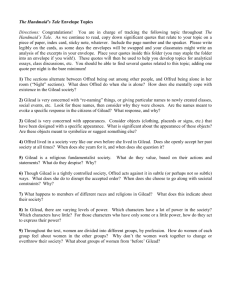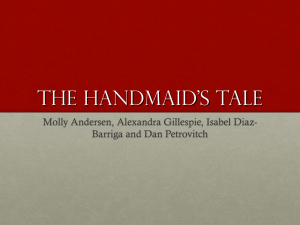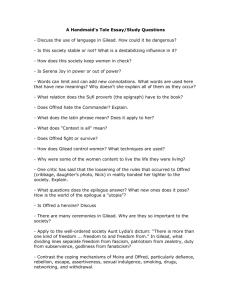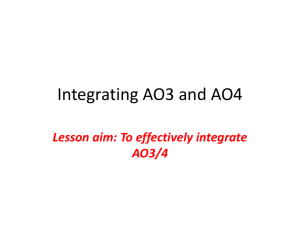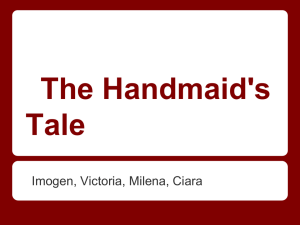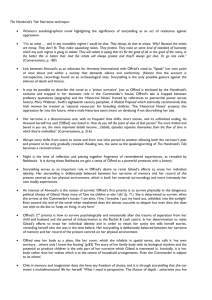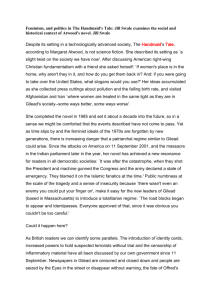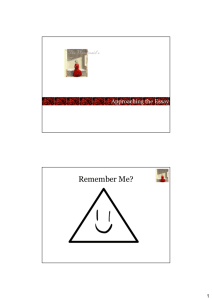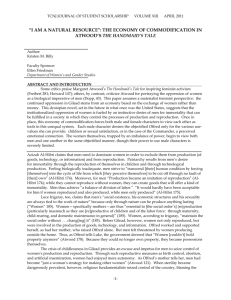The Handmaid`s Tale: Questions for Response, Discussion, Seminar
advertisement
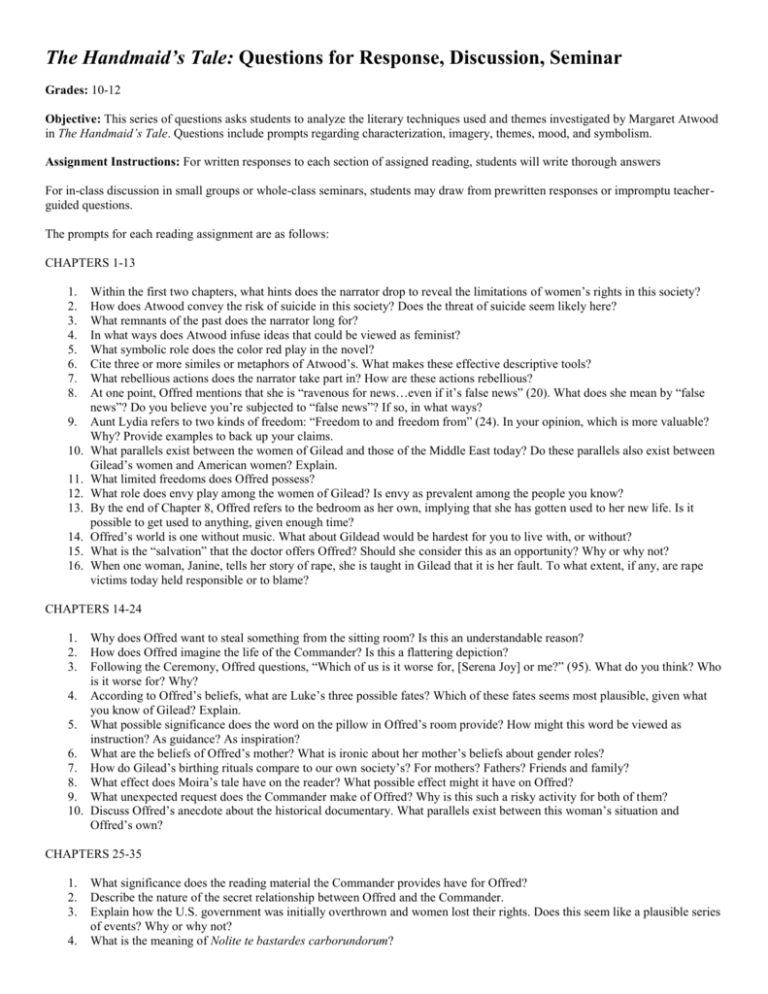
The Handmaid’s Tale: Questions for Response, Discussion, Seminar Grades: 10-12 Objective: This series of questions asks students to analyze the literary techniques used and themes investigated by Margaret Atwood in The Handmaid’s Tale. Questions include prompts regarding characterization, imagery, themes, mood, and symbolism. Assignment Instructions: For written responses to each section of assigned reading, students will write thorough answers For in-class discussion in small groups or whole-class seminars, students may draw from prewritten responses or impromptu teacherguided questions. The prompts for each reading assignment are as follows: CHAPTERS 1-13 1. 2. 3. 4. 5. 6. 7. 8. 9. 10. 11. 12. 13. 14. 15. 16. Within the first two chapters, what hints does the narrator drop to reveal the limitations of women’s rights in this society? How does Atwood convey the risk of suicide in this society? Does the threat of suicide seem likely here? What remnants of the past does the narrator long for? In what ways does Atwood infuse ideas that could be viewed as feminist? What symbolic role does the color red play in the novel? Cite three or more similes or metaphors of Atwood’s. What makes these effective descriptive tools? What rebellious actions does the narrator take part in? How are these actions rebellious? At one point, Offred mentions that she is “ravenous for news…even if it’s false news” (20). What does she mean by “false news”? Do you believe you’re subjected to “false news”? If so, in what ways? Aunt Lydia refers to two kinds of freedom: “Freedom to and freedom from” (24). In your opinion, which is more valuable? Why? Provide examples to back up your claims. What parallels exist between the women of Gilead and those of the Middle East today? Do these parallels also exist between Gilead’s women and American women? Explain. What limited freedoms does Offred possess? What role does envy play among the women of Gilead? Is envy as prevalent among the people you know? By the end of Chapter 8, Offred refers to the bedroom as her own, implying that she has gotten used to her new life. Is it possible to get used to anything, given enough time? Offred’s world is one without music. What about Gildead would be hardest for you to live with, or without? What is the “salvation” that the doctor offers Offred? Should she consider this as an opportunity? Why or why not? When one woman, Janine, tells her story of rape, she is taught in Gilead that it is her fault. To what extent, if any, are rape victims today held responsible or to blame? CHAPTERS 14-24 1. 2. 3. Why does Offred want to steal something from the sitting room? Is this an understandable reason? How does Offred imagine the life of the Commander? Is this a flattering depiction? Following the Ceremony, Offred questions, “Which of us is it worse for, [Serena Joy] or me?” (95). What do you think? Who is it worse for? Why? 4. According to Offred’s beliefs, what are Luke’s three possible fates? Which of these fates seems most plausible, given what you know of Gilead? Explain. 5. What possible significance does the word on the pillow in Offred’s room provide? How might this word be viewed as instruction? As guidance? As inspiration? 6. What are the beliefs of Offred’s mother? What is ironic about her mother’s beliefs about gender roles? 7. How do Gilead’s birthing rituals compare to our own society’s? For mothers? Fathers? Friends and family? 8. What effect does Moira’s tale have on the reader? What possible effect might it have on Offred? 9. What unexpected request does the Commander make of Offred? Why is this such a risky activity for both of them? 10. Discuss Offred’s anecdote about the historical documentary. What parallels exist between this woman’s situation and Offred’s own? CHAPTERS 25-35 1. 2. 3. 4. What significance does the reading material the Commander provides have for Offred? Describe the nature of the secret relationship between Offred and the Commander. Explain how the U.S. government was initially overthrown and women lost their rights. Does this seem like a plausible series of events? Why or why not? What is the meaning of Nolite te bastardes carborundorum? Analyze Atwood’s investigation of the phrase “Night falls.” What rhetorical approaches does Atwood employ in this opening paragraph of Chapter 30? 6. What is the nature of Offred’s first real conversation with Serena Joy? What does Serena Joy suggest? Why do you think she makes this suggestion? 7. What happened to Offred’s predecessor? What foreshadowing has Atwood provided to indicate this? 8. How does the Commander justify the current lot of women in Gilead’s society? What specific reasons does he give? 9. In what ways does Atwood draw upon Biblical text throughout The Handmaid’s Tale? Why do you think she uses so many Biblical references? What is the effect of these allusions on the reader? 10. How does Offred respond to memories of her past life? Of her family? 5. CHAPTERS 36-END 1. What can be purchased on the black market in Gilead? Are these illegal purchases similar to items purchased illegally in the U.S. today? 2. How does the Commander justify the existence of Jezebel’s? Analyze his argument. 3. Based on Moira’s story, what parallels exist between Gilead and Nazi Germany? Do you see parallels to any other historic periods. Explain. 4. Offred narrates multiple versions of her first intimate encounter with Nick. For the reader, what is the impact of these varying stories of the same event? Why do you think Atwood chose to reveal the scene in this manner? 5. Discuss the narrator’s tone throughout the novel. Is this tone constant? Does it change at certain points in the narrative? Explain. 6. How does Atwood use vivid description to detail the Salvaging and Particicution? Provide some examples of Atwood’s description here. 7. A euphemism is the substitution of a mild or vague word or phrase for a harsh or offensive one. What sort of euphemisms does Atwood create for Gileadean society? Why do you think she uses euphemisms this way? 8. What is the significance of women’s names in Gilead? What about women’s names in our own society? 9. What chance does Offred take as her tale comes to a close? What other options does she have? What would you have done in her place? 10. Discuss the impact of the Historical Notes on The Handmaid’s Tale. Why do you think Atwood included this component to the novel?
